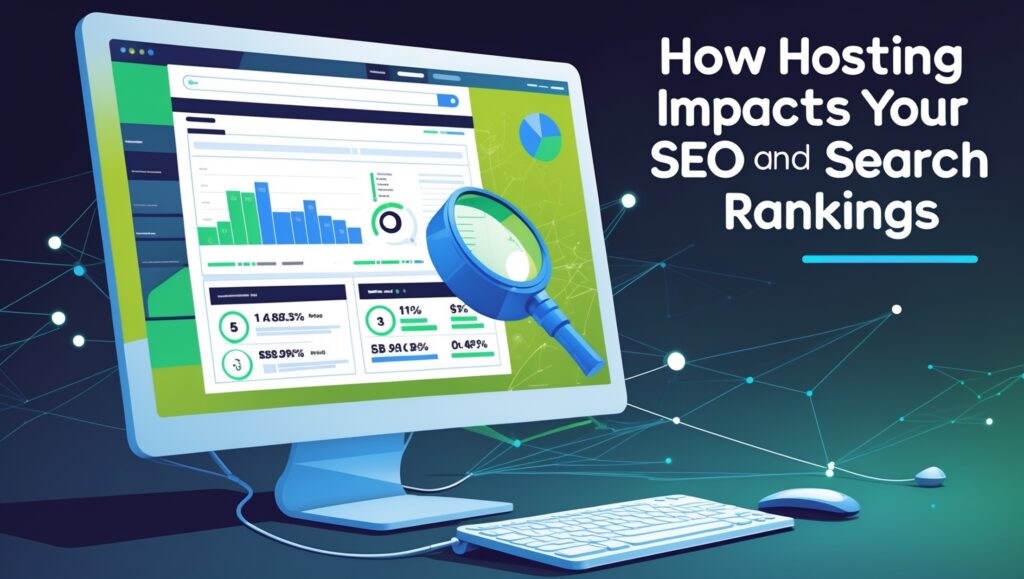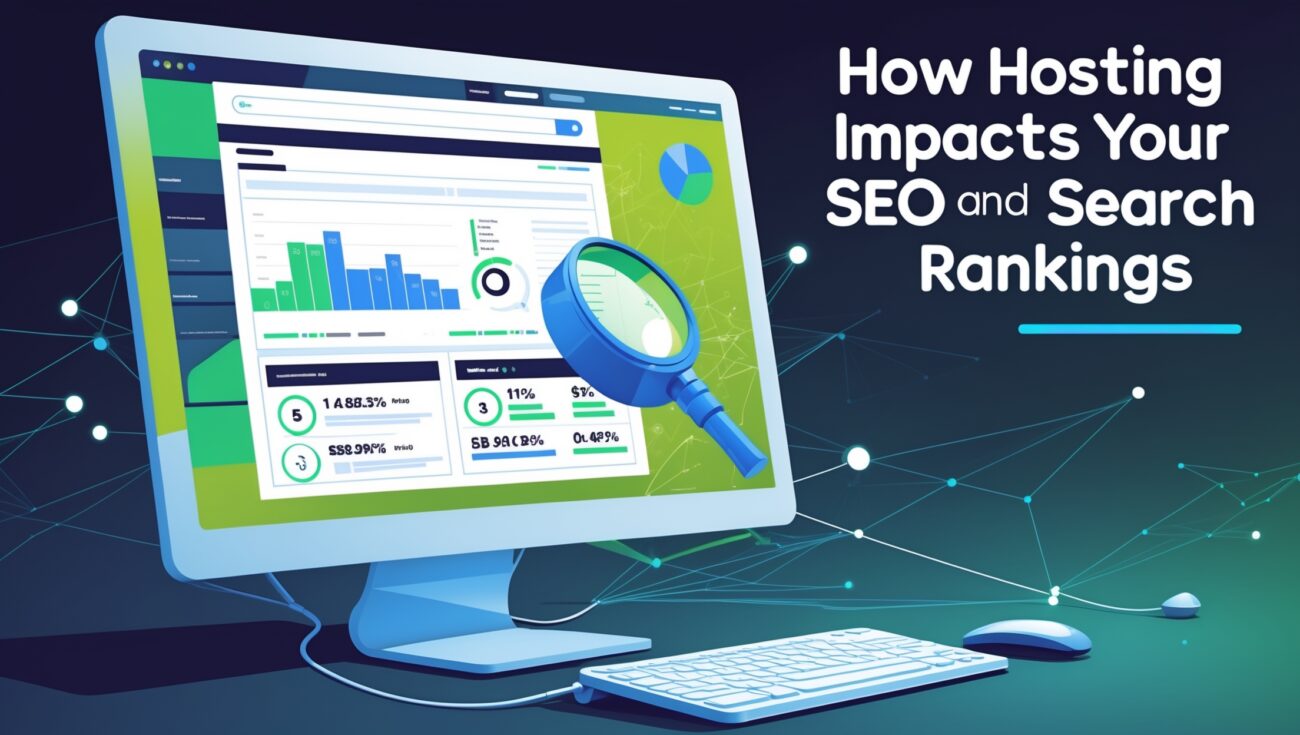How Hosting Impacts Your SEO and Search Rankings
When it comes to SEO, most people focus on keywords, backlinks, and content creation. While those are critical, one factor that often gets overlooked is web hosting. Your hosting provider has a direct impact on your site’s speed, uptime, and overall performance—all of which influence how Google ranks your website. If you’ve ever wondered why your site isn’t climbing search results despite good content, your hosting may be the missing piece. Get Siteground HERE! (Discounts)

Table of Contents
Why Hosting Affects SEO
Google’s algorithm is designed to provide users with the best possible experience. That means it favors websites that load quickly, stay online, and provide a secure browsing environment. Poor hosting can slow down your site, cause downtime, and even put your data at risk—all of which hurt your SEO rankings.
Website Speed and Search Rankings
Site speed is one of the most important ranking factors. Google has confirmed that faster websites rank better because users don’t like waiting. If your hosting provider doesn’t offer fast servers, caching options, or a content delivery network (CDN), your site may lag behind competitors, literally.
Uptime and Reliability
If your website is frequently down due to unreliable hosting, search engines will notice. A website that isn’t accessible sends a signal of poor reliability. Over time, repeated downtime can push your site lower in the rankings. That’s why hosting with a strong uptime guarantee (99.9% or higher) is essential.
Get Siteground HERE! (Discounts)
Server Location and SEO
The location of your server also plays a role. If your hosting provider places your site’s server far from your target audience, page load times increase. For example, if your audience is in the U.S. but your server is in Asia, visitors will experience slower speeds. Using a hosting provider with data centers closer to your audience—or a CDN—can boost both performance and SEO.
Security and SSL Certificates
Google prioritizes secure websites. That means having an SSL certificate (HTTPS) is non-negotiable. Many hosting providers include free SSL certificates, while others charge extra. If you don’t have SSL, your site may be flagged as “Not Secure” in browsers and your rankings will suffer.
Hosting and Mobile SEO
Since Google uses mobile-first indexing, your site’s mobile performance matters more than ever. A poor hosting provider without proper optimization tools may cause your site to lag on mobile devices. That delay results in higher bounce rates and lower rankings.
Get Siteground HERE! (Discounts)
Shared Hosting vs. Dedicated Hosting for SEO
If you’re using cheap shared hosting, your site may be sharing server resources with hundreds of other websites. If one site on the server is compromised or overloaded, it can affect your site’s performance. Dedicated or managed hosting can provide faster speeds, stronger security, and better SEO outcomes.
Managed WordPress Hosting for SEO
If you run WordPress, managed hosting providers often include automatic updates, security scans, and built-in caching. These features improve performance and reduce the chance of errors that could hurt your SEO rankings.
Hosting and Crawlability
Search engines send bots to crawl your website. If your server is slow to respond or overloaded, crawlers may not index all your pages. That means important content might not show up in search results simply because your hosting can’t handle it.
Impact on Core Web Vitals
Core Web Vitals—such as loading speed, interactivity, and visual stability—are now ranking signals. Hosting providers with optimized servers and caching options can help you meet Google’s benchmarks more easily, improving your SEO.
Backups and SEO Protection
Losing your website data due to poor hosting can be a nightmare. If your site goes down for an extended period, Google may de-index certain pages. Hosting providers that offer automated backups protect you from losing rankings if something goes wrong.
Get Siteground HERE! (Discounts)
CDN Integration and SEO
Many hosting providers now integrate with CDNs, which distribute your site’s content across multiple global servers. This reduces loading times for international visitors and boosts SEO for websites targeting a worldwide audience.
Email Hosting and Domain Authority
While not a direct ranking factor, using professional email linked to your domain (instead of Gmail or Yahoo) builds trust. A hosting provider that offers domain-based email can help improve your brand authority, which indirectly supports SEO.
Hosting Support and SEO Troubleshooting
If something goes wrong with your site—downtime, slow speeds, SSL errors—you need quick solutions. Hosting providers with strong technical support can resolve issues faster, preventing long-term SEO damage.
Choosing SEO-Friendly Hosting
Not all hosting providers are created equal. When choosing hosting for SEO, look for:
- Fast servers with SSD storage
- 99.9% uptime guarantee
- Free SSL certificates
- CDN integration
- Security features like firewalls and malware scanning
- Responsive customer support
Final Thoughts
Your hosting provider is more than just a place to store your website—it’s the foundation of your SEO success. Investing in high-quality hosting means faster load times, less downtime, and stronger rankings. If you’ve been working hard on content and backlinks but aren’t seeing results, it might be time to upgrade your hosting for better SEO performance.
1. Hosting and Bounce Rate
A slow site makes users leave quickly. Google interprets high bounce rates as a sign of poor user experience, lowering rankings. Good hosting reduces bounce rates.
2. Impact on Conversion Rates
Faster hosting doesn’t just help SEO—it improves sales. A site that loads in under three seconds can double conversion rates compared to a sluggish one. Get Siteground HERE! (Discounts)
3. Hosting and Structured Data
Some hosting providers offer server-level caching and optimization that makes structured data load faster, improving how your site appears in Google’s rich snippets.
4. SSL Renewal Issues
Cheap hosts sometimes don’t auto-renew SSL. If your SSL expires, your site may temporarily drop in rankings until it’s fixed.
5. Hosting and Indexing Speed
Better servers help search engines crawl and index your new content faster, giving you a competitive edge when publishing fresh articles.
6. Blacklisted IPs
If you’re on shared hosting with spammy sites, Google may blacklist the IP. This can drag down your SEO despite having great content.
7. Hosting and Image Optimization
Good hosting supports compression and caching for media files, ensuring that images load quickly without hurting SEO scores.
8. HTTP/2 and SEO
Modern hosts with HTTP/2 protocol improve loading speed by handling multiple requests at once, which Google rewards in its ranking system.
9. Hosting and Voice Search
Since voice search relies heavily on fast results, sites hosted on slow servers are less likely to appear in voice search answers.
10. Hosting and Local SEO
If your hosting provider has local data centers, your site loads faster for nearby users, boosting performance in local search rankings.
11. Hosting and Algorithm Updates
Google frequently updates its ranking systems. Having a strong hosting foundation ensures your site won’t suffer when speed or uptime become more heavily weighted.
12. Eco-Friendly Hosting and SEO
Google has shown interest in sustainability. Using green hosting may not directly boost SEO, but it can enhance brand trust, which indirectly improves authority.
13. Hosting and User Retention
If users find your site fast and reliable, they are more likely to return. Returning visitors are a positive ranking signal.
14. Hosting for E-commerce SEO
For online stores, every second matters. Hosting that supports high-traffic spikes prevents crashes during promotions, keeping SEO stable.
15. Hosting Migration and SEO
When switching hosts, downtime during migration can temporarily harm rankings. Choosing a provider with free site migration ensures minimal SEO disruption.
Final Thoughts
Your hosting provider is more than just a place to store your website—it’s the foundation of your SEO success. From speed and uptime to SSL security and crawlability, every technical detail of your hosting impacts how search engines rank your site. If you want higher rankings and a better user experience, investing in the right hosting is non-negotiable.

